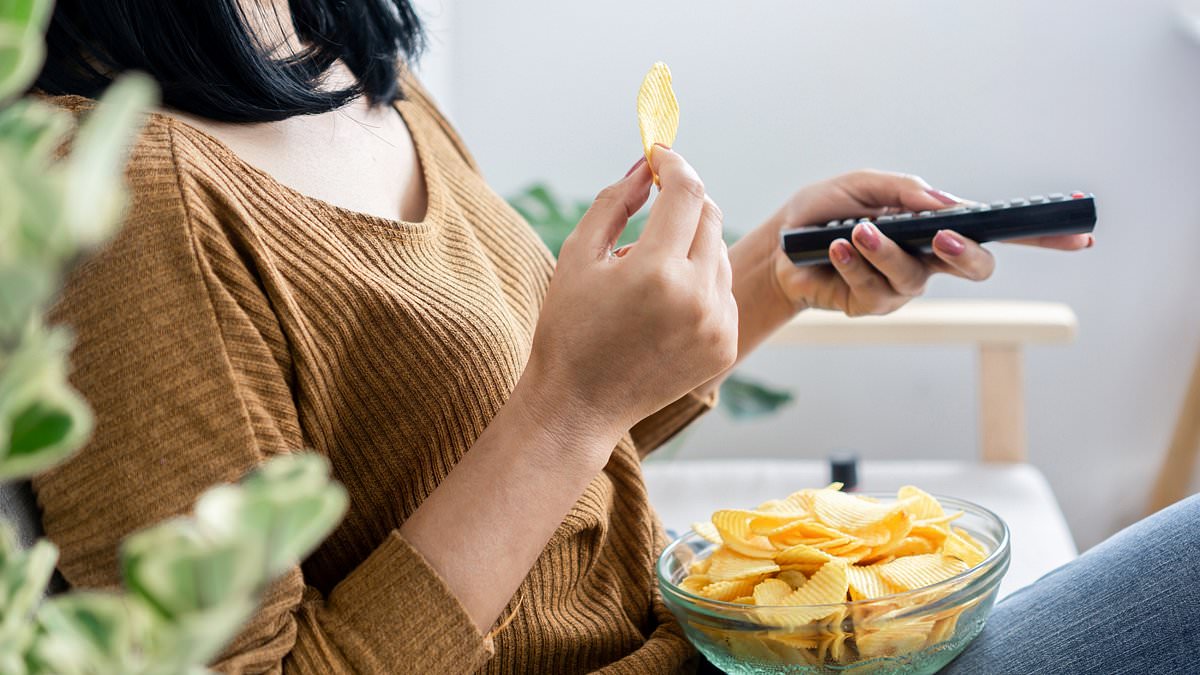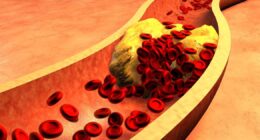Serving the classic snack combination of crisps and dip could make you consume almost double the amount of calories than just crisps alone.
Researchers at The Pennsylvania State University, US, found serving a salty snack alongside a dip led to people eating 77 per cent more calories.
Study author John Hayes, professor of food science and director of the Penn State Sensory Evaluation Center, expected that by adding an extra element to a snack, partcipants would compensate by eating less of the main item.
But this was not the case.
Instead, serving salty snacks like crisps with dip made no difference to how many crisps participants were willing to eat — they just ate the dip as well.
Participants also ate at a faster rate and took larger bite sizes than when they were served just crisps.

Researchers at The Pennsylvania State University, US, found serving a salty snack alongside a dip led to people eating 77 per cent more calories

Participants also ate at a faster rate and took larger bite sizes than when they were served just crisps
In the study, published in the journal Food Quality and Preference, 46 adult participants visited the lab twice over a two week period to eat the snacks.
On one visit, the participants were served served 70 grams of ranch-flavored crisps (about three small bags) on their own.
On another visit, they were served the same amount of crisps with a third of a cup (79ml) of ranch dip.
They were allowed to eat as much as they pleased, and researchers recorded and tracked the number of bites they took and how long they ate for.
The scientists were then able to calculate how fast they ate and the sizes of bite they took.
On average participates consumed 345 calories of crisps and dip per eating session compared to just 195 calories when they ate the crisps on their own.
‘The most striking findings of our study is that people didn’t eat fewer chips when dip was available — they ate the same amount of chips [crisps], plus the dip,’ Professor Hayes said.
‘This lack of compensation means that adding dip can substantially increase overall energy intake without people realizing it.’
He added: ‘Our participants consumed the same amount of crisps regardless of whether dip was present, leading to much greater energy intake when dip was available.’
The study, which was led by research assistant Madeline Harper, suggested that the dip encouraged people to eat more of the salty snack.
Ms Harper suggests the higher calorific intake may have been caused by people taking larger bites when eating the dip rather than eating faster.
Professor Hayes added that understanding snacking eating behaviour is crucial to addressing problems with overeating and obesity.
‘This research opens up new avenues for exploring how the physical properties of foods can influence our eating behaviors and ultimately, our energy intake,’ he said.
‘If we can slow people down, we can influence energy consumption without giving up the pleasure from food.’
The average woman needs to eat around 2,000 calories a day to maintain a healthy weight, while the figure is 2,500 for men, according to NHS guidelines.
Weight gain occurs when a person consumes more calories than they burn over time.
Obesity has been well established as increasing the risk of serious health conditions that can damage the heart, such as high blood pressure, as well as cancers.
Experts have blamed the nation’s ever-expanding waistline on the simultaneous rise of ultra-processed food and modern sedentary, desk-bound lifestyles.
Two thirds of all adults are now too overweight compared to just half in the mid-90s. Of those, about a quarter are obese.
In terms of obesity, this is equivalent to 16.8million people of which an estimated 8million are women, 7.4million men, 760,000 boys and 590,000 girls.
In the UK alone 26 per cent of adults in England are obese and a further 38 per cent are overweight, according to government statistics.










